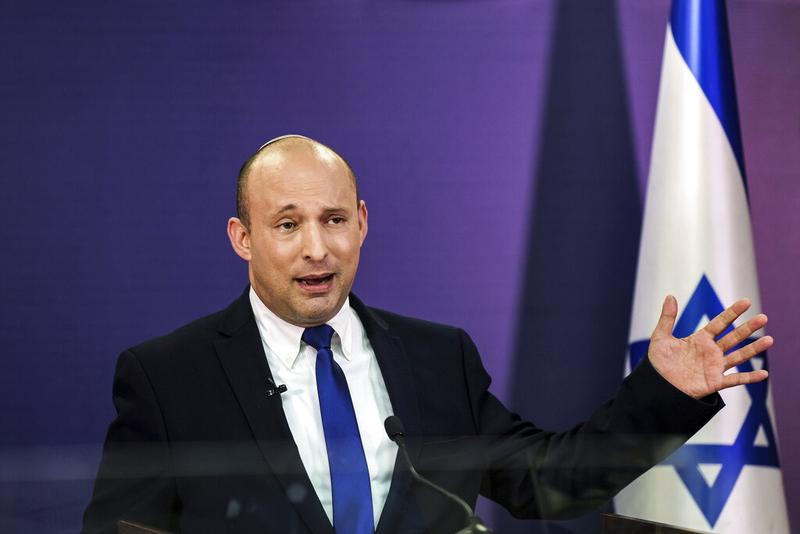 In this June 6, 2021 file photo, Naftali Bennett, Israeli parliament member from the Yamina party, gives a statement at the Knesset, Israel's parliament, in Jerusalem. If all goes according to plan, Israel will swear in a new government on June 13, which will see Bennett serving as prime minister for two years. (MENAHEM KAHANA / POOL VIA AP)
In this June 6, 2021 file photo, Naftali Bennett, Israeli parliament member from the Yamina party, gives a statement at the Knesset, Israel's parliament, in Jerusalem. If all goes according to plan, Israel will swear in a new government on June 13, which will see Bennett serving as prime minister for two years. (MENAHEM KAHANA / POOL VIA AP)
The new Israeli government set to end Benjamin Netanyahu’s 12-year tenure as prime minister signed its final coalition agreements on Friday, pointedly including term limits.
The coalition of parties from far-right to left is expected to focus mostly on economic and social issues rather than risk exposing internal rifts by trying to address major diplomatic issues such as the Israeli-Palestinian conflict.
Prime Minister Benjamin Netanyahu, Israel's longest-serving leader, is set to be succeeded on Sunday by a coalition that includes for the first time a party from Israel's Arab minority
Netanyahu, Israel's longest-serving leader, is set to be succeeded on Sunday by a coalition that includes for the first time a party from Israel's Arab minority.
READ MORE: Israeli parliament to vote on new govt on Sunday
Under a power-sharing agreement, Naftali Bennett, of the ultra-nationalist Yamina (Rightwards) party, will serve as prime minister for two years.
Bennett on Friday said the coalition "brings to an end two and a half years of political crisis", although it was unclear how long the coalition's disparate elements would hold together. He will then hand over to Yair Lapid of the centrist Yesh Atid (There is a Future) party.
ALSO READ: Netanyahu, battling for political life, attacks deal to unseat him
Among the agreements outlined by parties in what Lapid described as a "unity government" are:
- An infrastructure push to include new hospitals, a new university and a new airport.
- Passing a two-year budget to help stabilize the country's finances - the prolonged political stalemate has left Israel still using a pro-rated version of a base 2019 budget that was ratified in mid-2018.
- Maintaining the "status-quo" on issues of religion and state, with Bennett's Yamina party to have a veto. Possible reforms include breaking up an ultra-Orthodox monopoly on overseeing which foods are kosher, and decentralizing authority over Jewish conversions.
- An "overall plan for transportation" in the Israeli- occupied West Bank.
- A general goal to "ensure Israel's interests" in areas of the West Bank under full Israeli control.* Allocating more than 53 billion shekels ($16 billion) to improve infrastructure and welfare in Arab towns, and curbing violent crime there.
- Decriminalizing marijuana and moving to regulate the market.


